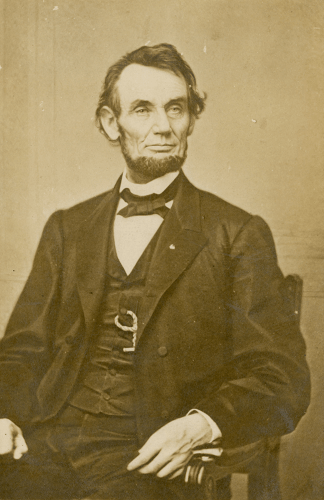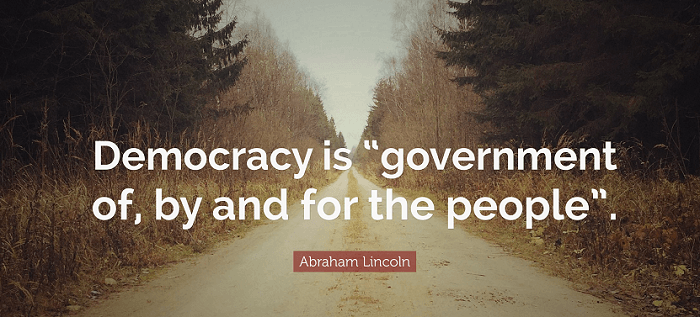Definition Of Democracy By Abraham LincolnDemocracy is a system of government in which citizens elect their leaders and participate in the governance of their nation. It is founded on the ideas of freedom, equality, and representation. Citizens use voting and other kinds of engagement in a democratic society to influence decisions. The people hold the government responsible, and it is obligated to uphold the law. Democracies come in various forms, such as direct democracy, in which voters cast their ballots directly on topics, and representative democracy, in which voters choose representatives to act on their behalf. 
The right to free speech, freedom of the press, and the right to assemble are only a few examples of the political and social rights that democracy supports. Additionally, it advocates for economic rights such as the right to property ownership and economic participation. Democracy promotes variety and pluralism, enabling the hearing many voices and viewpoints. Additionally, it encourages communication and compromise as a peaceful dispute resolution. But democracy may also face difficulties, such as the risk of tyranny of the majority, the possibility of corruption, and the supremacy of certain groups over others. It needs a well-informed and involved populace to operate well. History Of DemocracyIn the fifth century BCE, Athens, a city-state that had experienced substantial social and political transformations, was where the idea of democracy first appeared. A few aristocrats who controlled Athens before the emergence of democracy did so via money and ancestry. The lower classes, who felt marginalized and left out of the decision-making process, experienced the most tension and unhappiness as a result of this system. The politician Cleisthenes advocated a new governmental structure that would be more inclusive and equitable around 508 BCE. In addition to establishing a new council of 500 citizens who would be elected by lot and dividing Athens into 10 tribes based on geography rather than social class, he also enacted a number of other changes that would give the people more control. These modifications increased the number of people who could engage in politics and lessened the power of the aristocracy. The Assembly, which was made up of all male citizens above the age of 18, was the most important aspect of Athens' democracy. They would meet often to debate and cast votes on a range of topics, including legislation, public policies, and even court cases. Its highly participative direct democracy provided people a sense of ownership and responsibility in the administration of their city-state. It's crucial to remember, though, that Athenian democracy had its shortcomings. Women, slaves, and outsiders were prohibited from participating in politics, and the powerful and rich continued to hold a disproportionate amount of power. Nonetheless, the idea of democracy represented a great advance in the promotion of political equality and citizen involvement in governance. Democracy eventually gained traction in other regions of the world, including Rome and other European nations. Representative democracies, in which individuals elect representatives to act on their behalf, were established during the 18th century's Enlightenment when democratic concepts were given new life. As many nations throughout the world adopt democratic forms of administration, democracy is becoming a generally acknowledged type of government. Abraham LincolnIn office from 1861 until his assassination in 1865, Abraham Lincoln was the 16th President of the United States. Most famous for his leadership throughout the American Civil War and his attempts to abolish slavery, he is recognized as one of America's greatest presidents. Lincoln was raised in a log cabin and only acquired a minimal education while growing up. He was born in 1809 into poverty in Kentucky. Despite this, he got into politics and held positions in the Illinois state legislature and the U.S. House of Representatives. As the nominee of the newly established Republican Party in 1860, Lincoln campaigned for president. The institution of slavery, which was still legal in many southern states, was viewed as being threatened by his election, which raised controversy. A number of southern states seceded from the Union shortly after Lincoln's inauguration in March 1861, sparking the start of the Civil War. Lincoln put forth a lot of effort during the war to keep the Union together and abolish slavery. He backed the 13th Amendment to the Constitution, which outlawed slavery nationwide and issued the Emancipation Proclamation in 1863, stating that all slaves in Confederate-controlled territory were free. Lincoln is also renowned for his powerful orations, such as the Gettysburg Address, which he gave in November 1863 at the dedication of a cemetery for combat fatalities. Lincoln's presidency was terminated by John Wilkes Booth's assassination in April 1865, just days after the Civil War was finally won by the Union, despite the fact that the Union ultimately prevailed in the conflict. Although his passing was a profound loss for the nation, his memory continues to motivate Americans today. In Abraham Lincoln's ViewOne of the most revered American presidents, Abraham Lincoln, is remembered for his unwavering support of democracy and his role in helping to keep the Union together throughout the Civil War. Lincoln was a steadfast supporter of democracy throughout his life, and his legacy continues to influence American politics and culture. 
The Gettysburg Address, one of Lincoln's most well-known addresses, is regarded as a pillar of American democracy. Lincoln emphasized that democracy was a form of government that was "of the people, by the people, and for the people" in this address. He stressed the value of democracy as a structure that gives people the freedom to exercise their rights and obligations as citizens of a country and that it is based on the ideals of liberty, equality, and fairness. One of the most well-known presidents in American history, Abraham Lincoln, is frequently referred to be the defender of democracy. His work was devoted to protecting and advancing democratic ideals since he supported democracy's guiding principles. We will examine Abraham Lincoln's definition of democracy in this article and his thoughts and conceptions of what democracy implies. Democracy, according to Abraham Lincoln, is a system of government that is run by and for the people. According to him, democracy is a form of governance that gives people the freedom to perform their civic duties and rights. Lincoln believed that democracy was more than just casting ballots and choosing representatives; it was a way of life that allowed people to fulfill their goals and desires. Lincoln outlined his idea of democracy in his renowned Gettysburg Address, saying it was a government "of the people, by the people, and for the people." Being one of the most well-known definitions of democracy, this phrase now perfectly expresses what democracy means to many people throughout the world. Lincoln claimed that the foundation of democracy was the concepts of liberty, equality, and justice. Lincoln considered the United States Constitution the fulcrum of American democracy because it included these ideals. In his view, the Constitution offered a foundation for a government founded on the consent of the governed, in which each person had the right to participate in the political process. Lincoln also held the opinion that citizens must actively participate in democracy. He held that everyone had a duty to participate in politics, be aware of the issues, and hold their representatives accountable. He believed that democracy required active participation from the populace and was not a passive process. Individual freedom was a crucial component of Lincoln's vision of democracy. He thought that democracy was a system that let people follow their own ambitions free from interference from the state. According to him, the purpose of the government is to uphold each person's right to life, liberty, and the pursuit of happiness. Lincoln acknowledged that democracy had its drawbacks, though. He recognized that democracy might be messy and that balancing many social groupings' conflicting interests and ideals was frequently challenging. He felt that in order for democracy to function, people had to be prepared to make compromises and come up with creative solutions to the problems facing the country. Lincoln discussed the difficulties the nation experienced during the Civil War in his second inaugural speech, which was given in 1865. He recognized that the country's failure to uphold its democratic values had contributed to the war. The conflict, according to him, served as a reminder that democracy was a work in progress that needed continuing attention to detail and effort. Adoption Of DemocracyMany nations have adopted democracy in a variety of ways, and this adoption has frequently been impacted by a complex interplay of historical, cultural, economic, and political variables. As was the case in many Western European nations, where democratic institutions gradually arose over time via a process of discussion and compromise, in certain instances, the transition to democracy has been quite peaceful. The transition has been more difficult at times, like in many Latin American and African nations where democracy was established following protracted periods of tyranny, civil conflict, or societal unrest. Economic prosperity is a frequent factor that has aided in the spread of democracy. Strong middle classes and stable economies are more likely to support democratic norms since they stand to lose more under an autocratic or corrupt administration. This has been observed in several Western European and East Asian nations where democratic institutions have been established alongside the economic expansion. Popular movements or large-scale protests have, in certain situations, been the catalyst for political transformations. With the demise of the Soviet Union, this was the situation in many nations in Eastern Europe, as people protested in the streets for more political freedom and an end to authoritarian government. A number of Middle Eastern and North African nations also saw public upheavals during the 2011 Arab Spring, which resulted in the removal of long-standing authoritarian leaders and the development of more democratic governments.bThe promotion of democratic transitions in many nations has also benefited from the involvement of external players including foreign governments, NGOs, and international organizations. For instance, the European Union has used its political and economic might to press for democratic reforms in nations that want to join the organization. Although this support has frequently been accused for being selective and motivated by geopolitical objectives, the United States has also played a significant role in assisting democratic movements and transitions across the world. The majority of democratic regimes have a few fundamental characteristics, such as free and fair elections, an independent judiciary, a free press, and respect for human rights and civil freedoms, despite the fact that there are many diverse routes to democracy. These fundamental ideas offer a common framework for democratic administration all around the world, even though the specific type of democracy may differ from nation to nation. Salient Features Of DemocracyDemocracy is a form of governance that is distinguished by a number of notable characteristics or guiding ideals. These characteristics are crucial for making sure that democracy functions well and gives citizens a chance to participate in the decision-making process.
ConclusionThe notion of a government of, by, and for the people was the foundation for Abraham Lincoln's concept of democracy. He held that democracy was a system founded on the ideals of liberty, equality, and justice that enabled people to exercise their rights and duties as citizens of a country. However, he understood that democracy was a continuous process that required active engagement from the populace and a desire to cooperate to overcome obstacles. Lincoln's description of democracy still motivates people today all around the world and serves as a reminder of the continuing strength of democratic ideals.
Next TopicDefinition Of Electron
|
 For Videos Join Our Youtube Channel: Join Now
For Videos Join Our Youtube Channel: Join Now
Feedback
- Send your Feedback to [email protected]
Help Others, Please Share










